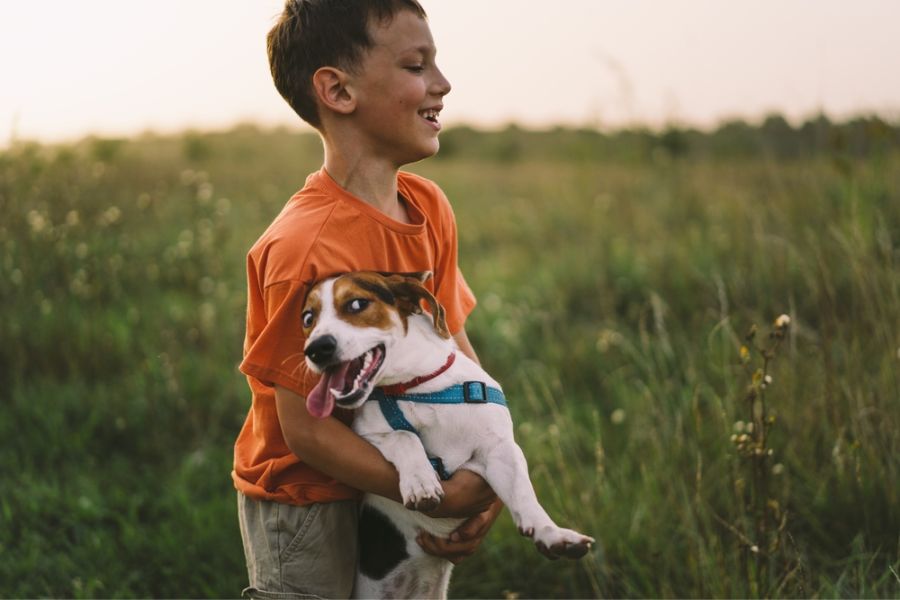What Age Do Jack Russells Calm Down? Time’s Tender Touch
Some owners appreciate the lively, energetic, and playful nature of Jack Russells, especially if they have an active lifestyle themselves.
On the other hand, some parents may find this breed too active and demanding. It’s likely that owners of Jack Russell Terriers wish their pets could calm down faster under pressure.
But at what age do Jack Russells calm down, and what can we do to make him more manageable? Join us, and we’ll share what we’ve learned with you.
Jack Russell Terrier Growing Stages
Figuring out changes in behavior, such as when a Jack Russell Terrier might start to calm down, requires insight about the breed’s stages of growth.

Puppyhood
In general, Jack Russells show the highest rate of growth during their puppy years, which last about a year after birth. Jack Russells are at their most active, curious, and reckless when they are young.
To mature into well-adjusted, sociable dogs, they must get early and consistent socialization.
Adolescence
The Jack Russell Terrier adolescent period lasts from about the age of one to two years. Adolescent Jack Russells are often full of energy and liberty, much like human teenagers.
During this time, dogs often push their boundaries and become stubborn, rude, and disobedient to their owners. At this point, you’ll need to be patient and train consistently.
Adulthood
This is the Jack Russell Terrier’s longest life stage, and it may also be the easiest to train. Adulthood commonly kicks off at about age two and continues until about age seven.
While Jack Russells still have a lot of energy at this age, they can be well-behaved pets if they get plenty of daily exercise and mental stimulation. It’s also when their unique personalities become most apparent.
The Senior Years
Age eight marks the turn of the senior years, aka the golden years, for Jack Russell Terriers, while some dogs can live to reach ten without showing any real signs of age. They may be less active or show signs of slowing down at this time.
Regular exercise and mental stimulation are still necessary for them, although on a less demanding level.
One helpful fact is that their lifespan is 12-15 years. That’s quite a bit of time to invest in loving and enjoying being with them.
At what age do Jack Russells calm down?
A Jack Russell Terrier will not often slow down until he or she is too old to continue that active lifestyle.
Jack Russells usually begin to “calm down” about the time they enter their senior years, which is somewhere between the ages of five and six. But this can vary greatly from dog to dog.
While some dogs may become quieter as early as their adult years, others can keep their youthful exuberance far into their golden years.

With each passing year, they tend to become more subdued. By the time they’re 2 or 3, many Jack Russells have tuned into a more settled behavior, in contrast to the erratic ways they often acted as their puppy and adolescent stages. As they get older, Jack Russells gain emotional stability and learn to channel their energy better.
If a Jack Russell Terrier calms down due to age, this is a natural part of life. Having fewer moving parts isn’t necessarily a bad thing, and it can make them easier to manage in a home with fewer members or in smaller living spaces.
What Can Be Done To Calm Down A Jack Russell Terrier?
You can’t wish for a Jack Russell to calm down quickly; that’s against the reality of the breed’s characteristics. These dogs are high-energy by nature, and this energy doesn’t disappear overnight.
Instead of looking for a sudden change in behavior, training, mental stimulation, and sufficient exercise are the best ways to channel this energy.

Jack Russells are smart dogs that are, in fact, pretty easy to train if you put in some time and effort.By effort, I mean actual, genuine effort.
They’ve got boundless amounts of energy; they are on a different level from other dogs in this aspect. And if you don’t give them a way to channel it, they’ll have a hard time focusing on what you want them to do. They’re actually rather good pets if raised in the right conditions.
Training
Training properly is key to helping Jack Russells calm down and develop appropriate behavior. Training can provide mental stimulation and help establish boundaries and routines.
Jack Russells like to take part in different kinds of games and sports. They perform well in activities that test their agility and intelligence, such as agility classes, flyball, and obedience training.
Because they are so active, they make great pets for people or families who like to stay busy and go on outdoor adventures.
Socialization plays a significant role in shaping a Jack Russell’s behavior as well. Early and ongoing socialization exposes them to various people, animals, and environments. It helps them learn to navigate different situations, develop confidence, and reduce anxiety or fear-related behaviors.
Well-socialized Jack Russells are more likely to exhibit calm and relaxed behavior in different social settings.
Provide Suitable Toys
By providing them with appropriate toys like chew toys, interactive toys, or mentally stimulating toys with different ways of entertainment as a channel for their energy, owners can help prevent behavioral issues that may arise from pent-up energy or boredom.
It’s important to choose the toys to suit their age, health, and individual preferences, ensuring a happy and balanced lifestyle for both the dog and their owner.
Conclusion
Keep in mind that even though they might become a bit less energetic as they age, Jack Russells are naturally active and lively dogs throughout most of their lifespan. Regular exercise and mental stimulation are necessary to keep them happy and healthy.
You need consistency, positive reinforcement, and patience when training and socializing Jack Russells. The key is to use reward-based methods and avoid harsh or punitive techniques









